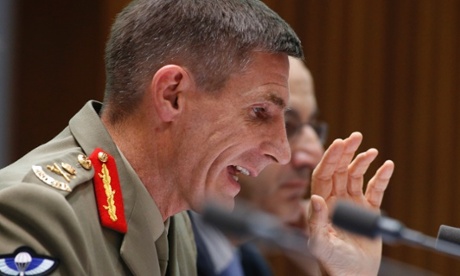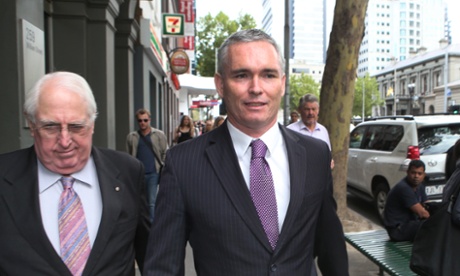Tess Lea theguardian.com, Monday 31 March 2014
Australians know the isolated and exotic city of Darwin through stories about cyclones, crocodiles and Aboriginal art, but it really is a cleverly camouflaged garrison town
The RAAF base in Darwin. Photograph: AAP Image/Australian Department of Defence
In his recent book Anzac’s Long Shadow: The Cost of our National Obsession, former ADF soldier James Brown correlates deep Australian ignorance about our contemporary military with our increasingly fantastical commemoration of the Anzac legend. Bedazzled by myths of Gallipoli, Australians neglect more pressing defence policy concerns.
It’s a compelling thesis, and one that closely parallels the situation in one of Australia’s most militarised city, Darwin.
Australians prefer to see the isolated and exotic city of Darwin through stories about cyclones, crocodiles, Aboriginal art, spicy market food and unlimited road speeds; a place that lets you go to the supermarket in bare feet and look normal. This way, we don’t have to notice the most significant militarisation effort in Australia’s post-war history, which is happening under our noses. The militarisation of the north is unknown to most of us and thanks to this ignorance, the new Cold War brewing in the Asia Pacific region, and Darwin’s place in it, is rarely being debated.
In 2012, US president Barrack Obama hailed "the next proud chapter in our alliance", announcing that up to 2,500 US Marine Corp personnel would permanently rotate through Darwin. The city is now a "lily pad" (the base America has when it doesn’t need to build a mini-city, just permanent access to a subordinate state’s geographic and strategic resources), adding to the largest empire of "not-really-bases" the world has ever known.
Darwin’s geo-strategic identity is a form of what old-school military manuals called "dazzle camouflage", where a combination of spectacle and background blending disrupts perception. Blinded by what is seen, the true dimensions of a thing escape view: Darwin is a garrison town that isn’t known as one, despite having been sculpted by defence. The first dam for drinking water was installed by the military; the Stuart Highway (Australia’s "Burma Road") was completed by soldiers. All air traffic at Darwin International Airport is controlled by the Royal Australian Air Force, for Darwin sits underneath the largest aerial defence training space in the world.
Of course, well before becoming a lily pad for the Pentagon’s pivot to Asia, Darwin became an important part of the global-technological security apparatus when, in the 1950s, mining began at Rum Jungle, 60kms to Darwin’s south, to supply uranium to the British and American nuclear weapons programs. For years, locals swam in the pit of that old mine, unaware that all biota for 15km down the Finniss River had been destroyed, and over 100 square km of surrounding floodplains contaminated.
A ceremony commemorating the Darwin bombing raid on 18 February 1942, which saw Japanese aircraft kill at least 243 people when they took the city by surprise. Photograph: AAP
During the second world war, the Top End was targeted by Japanese bombers for over 18 months. The most famous of these raids was the bombing of Darwin in February 1942, shortly after Pearl Harbour. More Americans than Australians died during the raids, many in unmarked sea graves. Today, this history of blood debt helps deflect any criticisms of what becoming a node in a US military map is drawing Australians into.
This is also how the US Marine Corps have bedazzled Darwin, not by concealing their presence but by broadcasting it. The "first long-term expansion of the American military’s presence in the Pacific since the end of the Vietnam War" has so far seen marines supporting the Aboriginal football academy, patiently fielding questions at information booths, playing with school children, and comparing their fitness coaching techniques to those of Australian soldiers.
Impressed, one forgets that Australia has sustained continual military action since 1999, from East Timor to Afghanistan and Iraq. In fact, a Roy Morgan poll before the last election listed defence issues as the second least important concern (outranked in unimportance by the needs of people outside of cities). Even for the ABC’s supposedly more politically aware constituency, less than 1% of respondents rated defence as the upmost election issue, compared with almost 13% rating asylum seekers.
The historian Regina Ganter makes the powerful point that Australian history begins in the north – not the south. Australia’s first international seafarers arrived this way, and many thousands of years later, a lucrative market in sea cucumbers made Top End Aboriginal groups veteran international traders long before British colonists arrived.
In fact, when he was circumnavigating Australia, Matthew Flinders relied on Dutch maps of Australia’s northern coastline drafted in the 1600s. The Dutch United East India Company had been sniffing around the manganese-rich Aboriginal lands in search of things to rip and ship, but had been repelled in their efforts by Australia’s original homeland security, at one time with a force of over 200 Aboriginal warriors, "in spite of our especial kindness and fair semblance," a frustrated Jan Carstensz wrote in his field reports.
Having repelled the Dutch, unimpressed by their nutmeg and beads, Aboriginal patriots fought outnumbered, out-legislated battles against the Martini-Henry military rifles and biological warfare of invading settlers. Dispossession bequeathed land the size of Cyprus to Bradshaw Station, first for cattle, and now as the Bradshaw Field Training Area, one of the largest weapons training grounds in the world.
Repulsed from expanding their empire, the Dutch returned their focus to the Straits of Malacca, the skinny stretch of water between Singapore, Malaysia and Indonesia. Only 2.7km at its narrowest point, the Straits are a geographical chokepoint. Controlling the Straits, the Dutch controlled their empire. As the shortest sea route between the Gulf countries and Asia, today’s Straits are China’s and Indonesia’s energy corridor. Australia’s too for that matter. If blocked, nearly half the world’s fleet would need to reroute through the Indonesian archipelago. Handy, then, for a military hegemon to have sea-air striking range from a docile little place like Darwin.
While the mustering of force in Australia’s northern reaches can be interpreted as merely strengthening defence capabilities against an attack on continental Australia (purportedly our primary security threat), the imperial intent of our main ally, and the propensity for our defence deployments to threaten our neighbours must be interrogated far more thoroughly than is now the case.
In allowing Australia’s foreign policy interests to be played out of sight, out of mind, in a town that also hides its own nature from itself, we avoid debating difficult questions. What does being a subordinate ally to a military force clinging to its global primacy commit us to? What are our liabilities and responsibilities? At what point do Australian sovereign interests diverge from America’s security objectives? And what are we prepared to do about it?






 The commander of Operation Sovereign Borders, Lieutenant General Angus Campbell, during a Senate estimates hearing. Photograph: Daniel Munoz/AAP
The commander of Operation Sovereign Borders, Lieutenant General Angus Campbell, during a Senate estimates hearing. Photograph: Daniel Munoz/AAP









 Craig Thomson: Magistrate Charlie Rozencwajg was scathing of Thomson's conduct. Photograph: David Crosling/AAPIMAGE
Craig Thomson: Magistrate Charlie Rozencwajg was scathing of Thomson's conduct. Photograph: David Crosling/AAPIMAGE




